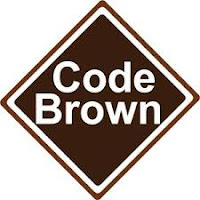

 Remember how Paul..the same Paul who wrote Philemon..used the "S" word
in Philippians 3? In the original Greek he used the word "skubala,"
which your class Bible translates "rubbish," but the word is much close
to the English S-word. More on that word use here.
Remember how Paul..the same Paul who wrote Philemon..used the "S" word
in Philippians 3? In the original Greek he used the word "skubala,"
which your class Bible translates "rubbish," but the word is much close
to the English S-word. More on that word use here.
Here's a post by Alex Heath:
“Skubala?” The Apostle Paul Uses the Word “Sh--” in the Bible
This shocked me. In Philippians 3:8 (KJV), the Apostle Paul says,“Yea doubtless, and I count all things but loss for the excellency of the knowledge of Christ Jesus my Lord, for whom I have suffered the loss of all things and count them but dung, that I may win Christ.”In our English translation of Scripture, we read several deviations of what was commonly referred to as animal excrement in Paul’s day. The NIV translation says “garbage,” the ESV says “rubbish,” and The Message translation says “dog dung.”
Of all places, Urban Dictionary actually gives some helpful insight into the use of this word in this passage. The word that Paul uses was a Greek term called “skubala."
"This is a Greek word that is the equivalent to the modern English word "s__.” Skubala is a rare word, used only in Philippians 3:8 in the New Testament. Dung, rubbish, refuse, and a loss are various inaccurate translations of the Greek word. No translation accurately translates this term to its modern English equivalence: “sh--.” The word means “excrement” either animal or human.“Wait, so you’re telling me that the APOSTLE PAUL (one of God’s most anointed and renowned evangelicals in the history of the early church) used a CUSS WORD in SCRIPTURE? Hold the phone.
There must be something wrong with this. Paul would have never used such a dirty word in an inspired text. Or would he?
I believe Paul uses the word "shit” in this passage because he is trying to create an incredibly stark and extreme contrast between the the “things” of the world, and the pursuit of Christ. It’s serious business.
Now don’t get me wrong, I don’t believe that this example automatically condones the use of foul language for Christians. Scripture is very clear that we are to not let any foul language cross our lips (Exodus 20:7, Ephesians 4:29).
Paul used what would have been the equivalent of a “four letter word” in his time to help communicate the message of the gospel. How does that affect us? How do we rationalize through that fact?
Just something to think about. LinK
 hat did you learn about this text (Pic) and context?
hat did you learn about this text (Pic) and context?We did the first batch of timelines. See this for more info.
Student timelines are always an amazing experience! Remember this one: Demise, Demise, Demise, Demise
Soap from previous classes. Click here and here.
How did you interpret the text "BRING IT BACK IN A DIFFERENT FORM" with no context?
- What do you remember about this second version of the song. What did you learn about texts and Three Worlds?
- Talk about interpreting the two versions of U2's "Where The Streets Have No Name."
- Mention the challenge of interpreting from scratch (no previous knowledge and no research for the first version, and then having some "historical world" help and "literary world" (lyrics) help for the second version.Post some of your notes you took in class as you watched/listened.Which version was easier to interpret,and why? Which version did you like better and why?How did this song make you feel and why?Combine your thoughts on the two versions, and come with an answer (similar to your signature paper style) as to what the song is about and why. Give at least one direct evidence for your thesis.

- Yours:
- ONE GREAT PERSON SURVEYS
-------- --
( My Dack Rambo story? Click here to read all about it, and for the sequel click:
" I Deny the Resurrection and I am not straight."

(uh, better click that title and get the context!)
we apply some "Three Worlds" theory to Matthew 18 and the topic of "Who is great?"
As we study, apply as many literary world symbols as you can
A video on that chapter featuring Keltic Ken:
Related outtakes:
Of LITERARY WORLD note:
- -
Of Historical World note:
- What did you learn about a millstone ? ( notes at
W
this (click)
vi
this (click)
NOTE A RECURRENCE OF the phrase "little one."
Watch
this (click)
video, "Weight of the World," and be prepared to discuss what these two items are


- Review: Why did we say the missing was temporarily greater than the rest of us?
Page 19 of Syllabus,Matthew 18 Outline
(by Greg Camp/Laura Roberts):
1 Question #1: Who is Greatest?
2-17 Responses (each are counter proposals):
2-10 Response #1: Children
2-4 Counter Proposal: Accept children
5-9 Threat: If cause scandal
10 Show of force: Angels protect
12-14 Response #2: Sheep
(Who is temporarily greater?)
12-14 Counter Proposal: Search for the 1 of 100 who is lost
15-17 Response #3: Brother who sins (counter proposal)
15a Hypothetical situation: If sin
15-17 Answer: Attempt to get brother to be reconciled
17b If fail: Put him out and start over
18-20 Statement: What you bind or loose
21-22 Question #2: How far do we go in forgiveness?
23-35 Response #1: Parable of the forgiving king/unforgiving servant
----------------Read verses 15-17 and then ask yourself:
"What did it mean in their historical world to treat people like
"tax collectors and sinners?"
"What did it mean in their historical world to treat people like
Two answers
1)Don't allow them in your bounded set.
2)How did Jesus treat tax collectors and sinners? In a centered set way. Tony Jones writes:
but because anyone, including Trucker Frank, can speak freely in this church, my seminary-trained eyes were opened to find a truth in the Bible that had previously eluded me.”...That truth emerged in a discussion of Matthew 18's "treat the unrepentant brother like a tax collector or sinner.":"And how did Jesus treat tax collectors and pagans?" Frank asked aloud, pausing, "as of for a punchline he'd been waiting all his life to deliver,"....., "He welcomed them!""
Cli


















No comments:
Post a Comment